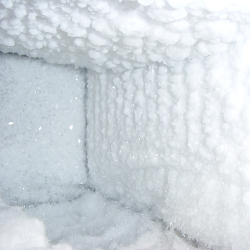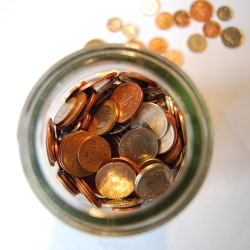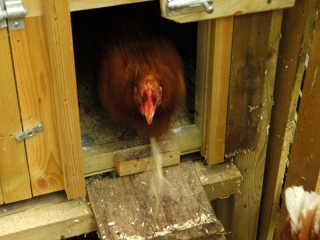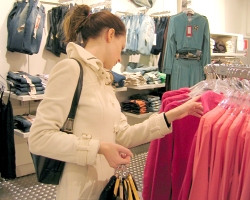Regifting – do you do it? how do you do it?
The other day, a friend of mine, who wishes to remain anonymous for reasons that may become more apparent later, told me he had spent part of his weekend wrapping Christmas presents. I pulled a WTF face – wrapping Christmas presents? in September?!
He explained that whenever they have to go to the faff of getting the paper, tags, tape etc out to wrap one present, like a birthday present, they wrap a whole bunch of them at the same time to be more efficient. He added that they also have a cunning present recycling strategy.
Whenever the friend and his lady are given birthday/Christmas/random presents they don’t want, they stick a post-it note on it and add it to their to-give present box so it can be regifted in the future without any chance of it ending up back with the original giver.
As I’ve explained before on Recycle This, I’d much rather not get the gifts in the first place and unlike my super nice friend, I’d rather make things a bit awkward than accept the items because I’m uppity and mardy like that – but I think the post-its are a great, simple idea to avoid re-gifting embarrassment.
Do you regift? Or otherwise give gifts of things you already have around your home? Do you have any strategies to avoid giving them back to the giver?
If you’d never regift, why not? How would you feel if you were given something you suspected had been re-gifted? Would you say anything?
Read More£100 for lie-ins: to get an automatic chicken door or not?
Since we got the chickens in June, I’ve been thinking, on and off, about getting an automatic door for their pop hole. Light-sensitive, it’ll open first thing in the morning and close again after they’ve put themselves to bed when it gets dark. It’ll allow the chickens to live to natural rhythms rather than our rhythms, and in the winter, it’ll mean they get the maximum daylight possible.
But we don’t really need one.
Left to our own devices, we stay up late and sleep late. I list “sleep” as an active hobby: I like the feeling of lying down, of being snuggly warm, and my vivid often lucid dreams are engrossing, often interactive, movies personalised for an audience of one. And nothing beats a lazy morning in bed, surrounded by animals, and reading a good book. Sadly that sort of lifestyle isn’t conducive with having a dog, let alone chickens and while I’m quite adept at running down to the coop in my robe, then jumping back into bed for a couple more hours of snoozing, it just isn’t the same. To be fair, we do get up in good time during the week but to not have to get up that early on weekends or days off, that would be great. An automatic door opener would allow us to wake up in our own time then go down to check on the chickens after breakfast.
But we don’t need to have lie-ins, we just like them.
Read MoreUsing expensive freezer real estate efficiently
 I’m all about space efficiency.
I’m all about space efficiency.
Our last house was so filled to bursting by the time we moved out that we had to be efficient. Shelves everywhere. Storage units/boxes everywhere. Sometimes I think the cats were lucky they weren’t attached to harnesses and hung from the ceiling to save floor space. We nearly cried when we moved here: cupboards can be opened without all their contents spilling out, there are shelves that are empty save for an ornament or two, and each room has space for me to dance the tarantella with the cats (the closest I get to spinning them around) – but there are still a few spots where space is not so cheap & plentiful. The kitchen in general is pretty packed – it’s the smallest room of the house (save for the understairs cupboard) and since we cook, bake & preserve, we use it a lot for a lot of different purposes. However, it’s the fridge and freezer where we feel the squeeze the most – two small under-cupboard appliances – which are always crammed full.
A few weeks ago, some of our favourite ice cream was on buy one get one free but we couldn’t get any because we didn’t have any freezer space. It was then when we realised we weren’t making particularly good use of our precious freezer real estate. One of the drawers – nearly a third of the total space – was filled with a huge lamb joint we’d got super-super cheap, some cheap burger buns bought on BOGOF and a bag of ice which someone brought to our party at New Year, which we’d barely touched. The first two items were themselves bargains but had both sat in there for weeks; the ice was just taking up space — and all three things were costing us money to store and stopping us benefiting from other bargains.
We now have a new usage policy regarding the freezer: we’re not regarding it as a deep freeze for long term storage any more. We’re using it as a way to extend the life of something fresh by a few days – a fortnight at most – but not for storing things for longer than that (with the exception being my small pots of chillis and spring onions – bought in bulk, sliced up and frozen they don’t take up much room but save us buying fresh all the time). Aside from bagels (which freeze well and are a great emergency-lunch bread), we’re not freezing bread and no more buying things – whether bargains or not – especially for the freezer unless we have a specific exit plan for them, ie, we’ll eat them within a fortnight. We’re also not storing any more than a tray of ice except in exceptional circumstances (namely, a big party).
It’s early days in the new policy so I’m not sure how it’ll pan out – we’re brilliant at forgetting about things in there – but it’s worth a shot. I think the most important thing is to be aware that it can be a black hole for food, and the longer food stays in a freezer the more likely it is to end up as food waste, because of freezer burn, it acquiring that cardboard-y taste or changes of taste.
How do you use your freezer efficiently? Do you have any tips for maximising the limited space? Is there anything you just won’t freeze – or anything you obsessively do keep in there?
Read MoreHow can you tell when something is good quality?
This is another cross-post between The Really Good Life and my recycling blog, How Can I Recycle This?
The first stage of the recycling triangle is Reduce – reduce the amount of things you buy/use and buy items that’ll last and can be repaired rather than ones that need replacing frequently. A key rule of frugal living is similar: don’t pay twice for something – a more expensive quality item might last two-three-four-times longer than the cheaper alternative.
But how can you tell when something is good quality – that it’s worth the extra money and it’ll last?
Back in the day, it used to be all about price – better quality items made with better quality materials cost more. But the rise of all powerful brands put an end to that. Now poor quality items made from poor quality materials command a huge price if they’ve got the right logo on them. And once respected brands have lowered their quality, or spun off lower quality ranges, without dropping their prices, hoping we won’t notice the difference. I’ve used a picture of clothes because the fashion mark-up is really obvious with them, but it’s an issue across the board: clothes, food, homewares, tools, electronics, cars, cleaning products…
Whenever we’re making major purchases, we look up reviews online/tap the expertise of friends on Twitter to ask their opinions but people have a habit of suggesting the thing they have/use rather than the best thing: partly because it’s often all they have experience of and partly because the more people who join them helps justify it’s their decision. Most people I know have their own area of expertise – for example, I know a lot of geeks and they know from painful experience what computers should be bought and what should be avoided like the plague – but outside their area of knowledge, they’re at a bit of a loss.
So how do you tell what’s good and what isn’t? What cues tell you when something is worth the extra money? And when it definitely isn’t?
Do you have a particular area of expertise? If so, tell us all about it!
Read MoreThoughts on Ken Rockwell’s How To Afford Anything
 Already respecting his views on photography, John was interested to find an old article by Ken Rockwell called “How to Afford Anything” a few weeks ago.
Already respecting his views on photography, John was interested to find an old article by Ken Rockwell called “How to Afford Anything” a few weeks ago.
Reading it in parallel, we quickly noted that while there wasn’t anything completely mindblowing for us, it was a mostly excellent article, we agreed with most of it and I would highly recommended reading it regularly. But there are a few points that I disagreed with though and I want to discuss them here. (I’ve quoted random bits of the article so it seems very disjointed but I’ve tried for each quote to make sense within itself.)
Don’t eat out: unless you’re eating off the dollar menu at fast food (as I have always done), cook your own food!
I like food too much to never eat out. We ate out more in the past than we do now but we still eat out once or twice a week. We don’t go to the most expensive restaurants but not the cheapest either: we rarely choose where we’re going based on price.
One thing though: we don’t spend a lot of money on drinks. I don’t drink alcohol and John doesn’t drink wine so we might have a soft drink/beer respectively when we arrive but will then switch onto tap water. We also invariably have better tea & coffee at home than the restaurant can offer so that’s another saving. Not having a restaurant-cheap bottle of wine and after dinner coffees saves us at least £20 a meal – and when the food bill is only £30, that’s quite a “saving”. (Ken does touch on this later.)
I’d class enjoying food as a hobby – I would never spend £2000 on a camera like Ken would, I’d spend it on 200+ curries instead.
Everyone has their own luxuries. Speaking of which:
“A luxury, once sampled, becomes a necessity.”
I personally both agree and disagree with this. Yes, some “luxuries” become necessities (the day I upgraded to a decent bra from budget ones was a special, special day indeed: my perky boobs never looked back) but it’s not always the case – we went on a really expensive (for us) holiday a few years ago but I’ve equally loved holidays since then which have been considerably less glamorous & far-flung – and have cost a tenth of the price. I’m also happy to eat frugal homemade food the rest of the time to pay for those two meals out a week – mostly because our frugal homemade food can be super tasty, but I think I’d feel the same way if it was more humdrum. Well placed luxuries provide variety in life.
Read More





